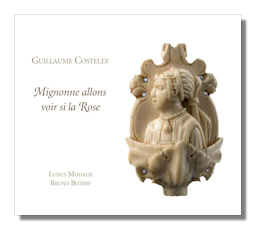
The Internet's Premier Classical Music Source
Related Links
- Latest Reviews
- More Reviews
-
By Composer
-
Collections
DVD & Blu-ray
Books
Concert Reviews
Articles/Interviews
Software
Audio
Search Amazon
Recommended Links
Site News
 CD Review
CD Review
Guillaume Costeley

Mignonne, allons voir si la Rose
- Mignonne, allon voir si la roze
- Chassons ennuy
- La terre les eaux va buvant
- Je plains le temps
- Esprit doux de bonne nature
- Dialogue de l'homme et son coeur
- J'ayme mon Dieu
- Las je n'eusse jamais pensé
- Prise du Havre
- Puisque la loy
- Perrette disoit Jehan
- Muses chantez
- Las je n'yray plus
- Sus debout, gentils Pasteurs
- Seigneur Dieu, ta pitié
- Allez mes premieres amours
- Quand le Berger
- Quand l'ennuy facheux vous prend
- Le plus grand bien
- Grosse Garce noire et tendre
- Bouche qui n'as point de semblable
- Du clair soleil
- Allons au vert boccage
- Fantasie sur orgue ou espinette
- Venez dancer au son de ma musette
- Toutes les nuitz
- Sy c'est un grief tourment
Ludus Modalis/Bruno Boterf
Ramée RAM1301
This is an exciting and compelling new CD of particularly sensitively-accompanied sacred and secular songs from the French Renaissance by the relatively unknown Guillaume Costeley, who lived from about 1530 to 1606 – roughly contemporary with Ronsard, that is. We believe that Costeley was born in Pont-Audemer (Normandy); we do know that he was organist at the cathedral of Évreux, also being official composer to Charles IX.
Although this work necessarily required an emphasis on spiritual composition, and although his style owed as much to the polyphonic writing of his predecessors, his place as a key figure in the French Renaissance is assured by his secular output. He's best remembered for the one emblematic chanson, "Mignonne allons voir si la rose" (to a text by Ronsard), though his interests – and successes – extended to serious, moral, "rustic" and at times quite "red-blooded" subject matter.
This CD with over two dozen songs and lasting over 70 minutes presents the full gamut of Costeley's work. They're intelligently placed to provide variety, contour and gentle climaxes and – above all – a sense of exploring Costeley's rich sound world in meaningful depth. Necessarily, there is a consistency of idiom in these pieces. Yet Ludus Modalis easily draws out every conceivable nuance and variation of texture, timbre, dynamic, color – and length: "Quand l'ennuy facheux vous prend" [tr.18] lasts barely a minute; "Prise du Havre" [tr.9] over seven.
Ludus Modalis is a French ensemble (actually based in Évreux itself) of a dozen singers (Nathalie Marec & Annie Dufresne, sopranos; Sophie Toussaine & Jean-Christophe Clair, countertenors; Bruno Boterf & Reinoud Van Mechelen, tenors; François Fauché, bass; Freddy Eichelberger, harpsichord) with Bruno Boterf as their conductor. Their repertoire extends from music of this period to contemporary music, employing male, female and even children. Freddy Eichelberger plays a reproduction harpsichord (with four solo numbers, [tr.s 5,13,16,24]); members of the ensemble play the other unobtrusive instruments. Their overt intention is to examine the sonic, textual and purely musical conventions of this repertoire. It's no mere linear recital: the articulation of every word is decidedly aimed at clarity and a celebration of what makes the text convey what it does, song after song.
At the same time, the experience and expertise of Ludus Modalis mean that the essence of minimally or unaccompanied Renaissance polyphony on a relatively small scale (no one work on the CD features more than half their number) seems just as important as the particular use Costeley makes of it in each different way. In other words, a verbal-musical context is created, whether implicitly or case by case, song by song. This then informs and moulds the performance of each piece. Very authoritative, convincing – and very captivating listening.
The acoustic is that of the church of Saint Martin, Brémontier-Merval, in France. It's pleasingly intimate and concentrated; yet allows the subtleties and color of the music to be projected perfectly. The "Digipak"-style presentation of the CD is well up to the usual high standard we expect from Ramée with the informative booklet (in English, French and German) containing also the full texts. There are precious few anthologies of the music of Costeley; indeed this is the only one devoted entirely to his lovely music. And it's an excellent place to start. He deserves to be better known: the quality of performing on this CD ought to do much to further that process.
Copyright © 2013, Mark Sealey





















